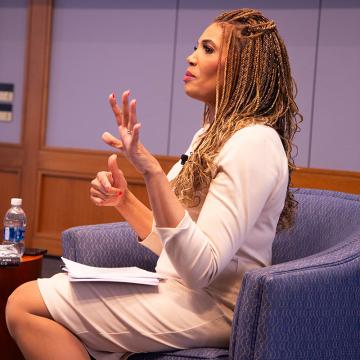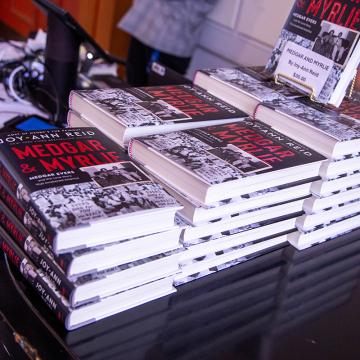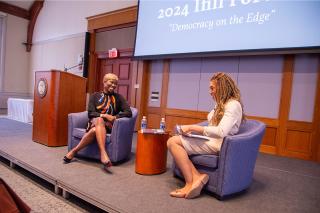On Tuesday, April 2, the Gwen Ifill College of Media, Arts, and Humanities hosted the fifth annual Ifill Forum, which honors the late Gwen Ifill ’77, ’93HD and her legacy as a ground-breaking Black woman journalist. Joy Reid, author, journalist, and host of MSNBC’s The ReidOut, graced the Simmons campus as the 2024 guest speaker, while NBC10 Boston and NECN anchor Latoyia Edwards served as the moderator.
In her welcoming remarks at the 2024 Ifill Forum held on April 2, Diane Grossman, Interim Dean of the Gwen Ifill College of Media, Arts, and Humanities, described this year’s guest speaker — author, journalist, and host of MSNBC’s The ReidOut — as representative of the trailblazing influence of Gwen Ifill ’77, ’93HD. “As Gwen put it, ‘I think the real bias in journalism happens with the stories we decide not to tell, the stories that we don’t even see.’ Our keynote speaker today, Joy Reid has truly taken that message to heart,” said Grossman.
Circuitous Journey to Journalism

“I want to acknowledge the importance that Gwen Ifill had on my own life,” began Reid, as she recounted her unlikely career in journalism, her first encounter with Ifill, and her commitment to the next generation. Born in Brooklyn, Reid was a “super nerd” who spent most of her childhood in a majority-Black neighborhood in Denver, Colorado. Being an athlete from Brooklyn saved Reid from being teased by her peers.
“I was also a newsy kid,” said Reid. “I was obsessed with the news since age six, and I remember being especially fascinated by the Iran hostage crisis.” However, she noticed that the media lacked representation. “One thing I did not really see on the news was people who looked like me — except for Gwen Ifill,” she recalled. “So, I was always drawn to her, as somebody who was one of the few Black people doing news at that time.”
In her youth, Reid did not aim to be a journalist. Rather, Reid’s mother encouraged her to be a doctor, but she abandoned this path after her mother’s untimely passing. Reid attended Harvard University and studied film, and later relocated to Florida to take a job in a newsroom for the WSVN Channel 7 morning show.
In the 2000s, Reid transitioned to political campaigning. In 2008, her colleagues invited her to join a presidential campaign, and she agreed. “A young man and Senator of Illinois named Barack Hussein Obama was running for President,” recalled Reid. “I had a chance to meet the Senator when he gave a talk in Miami, and you could just see his star power by the way he delivered his speech.” Reid noted that the heavily unionized crowd contrasted with Obama’s formal demeanor. “Suddenly, someone from the crowd yelled out ‘We love you!’ And Obama said, ‘I love you too, baby!’ And at that moment I knew that guy was going to be president.”
Following the successful presidential campaign, Reid worked as a pundit for MSNBC and as the Managing Editor of The Grio. “In the 2010s, my work centered on Black death,” says Reid, who covered seminal stories, including the shooting of unarmed teenager Trayvon Martin. “So #BlackLivesMatter became my beat.”
One day, the (now former) President of MSBNC Phil Griffin took Reid to breakfast and offered her a job as a correspondent. “Being a film major at Harvard, I had never studied journalism in any conventional way. But Phil saw my work on #BlackLivesMatter and believed in me.” For a time, Reid was a “sidekick” of sorts to Dr. Melissa Harris-Perry on her weekend morning show on MSNBC.
During this period, Reid and Harris-Perry traveled to Selma, Alabama. “I was walking outside, and all of a sudden I saw Gwen Ifill,” she recalled. “I started running across the street, screaming, ‘You are my idol! You are the most incredible person in the world!’ And she turned around and looked at me stunned, as if I were a mad woman running at her. And do you know what she did? She opened up her arms and she gave me the biggest hug . . . and her embrace of me was like the fulfillment of my life’s dream,” recounted Reid. “They always say never meet your idol, but I met my idol and she was awesome.”
Reid invoked the metaphor of a relay race to encapsulate Ifill’s legacy, as well as her own duty to the next generation of journalists. Growing up as the “sporty shorty” in track and field, Reid sometimes ran the third leg in the 4 x 100 meters relay. In this particular race, four individuals run 100 meters each and must pass the baton to one another. “The first person [to run] sets the pace for the entire race; this person is necessary for the rest of the team to succeed. And this is what Gwen Ifill did. . . . Then the second person grabs the baton without looking back and takes off. . . . The third leg takes the baton blind; you have to know what is behind you and then set the pace for the win. If the third leg fails, then the fourth leg can’t do anything about it,” explained Reid. She then addressed Simmons students in the audience: “We may not be looking at you, but we are there for you. Our hand is out for you to take the baton and take off. That is what I feel my job is.”
On the Edge of Democracy

Ifill Forum moderator Latoyia Edwards, an Emmy Award-winning NBC10 Boston and NECN anchor, discussed with Reid the precarious state of democracy in the current moment. “I am intrigued by the notion of ‘Democracy on the Edge.’ Some people believe that democracy itself is at stake in this upcoming election,” said Edwards.
“It’s unfortunate that we tell young people ‘This is the most important election of your life.’ But actually, this time, it is. This is an election to determine if we will ever have another election,” emphasized Reid. In her view, if Donald Trump is elected President of the United States once more, he will effectively “delay, dodge, and dismantle our justice system. And then he will have no incentive to leave the Office.”
On her show, Reid has a saying: “Scaring is Caring.” In other words, Reid takes it upon herself to warn Americans that “democracy is not promised.” As she elaborated, “This is a very young country. There are countries much older than we are that have lost their democracy. . . . So we need to guard democracy with everything we’ve got, and the most powerful thing we have is our vote.”
Black Women and Politics
“When I came to Simmons today, I felt at home,” said Edwards, who grew up in the Dorchester neighborhood of Boston. “This is such a diverse audience, and Black women showed up in droves.” Edwards noted that Black women were largely responsible for the outcome of the previous presidential election. She asked Reid, “What do you think the role of Black women should be in this election?”
“Convince Black men to stay on task,” responded Reid. “If Donald Trump comes back into office, then he and his administration will attempt to overturn all of the civil rights-related legislation since the 1960s. . . . This is an election of whether Black people — and especially Black women — will have any rights at all.”
Reid also addressed the criticism she receives from individuals and networks online and on the air, particularly regarding disagreements about race in America. “Even if I just say ‘I love puppies,’ someone will call me out for being the angry Black lady,” she explained. “My name is Joy. If you think I’m angry, then I can’t help you. I seem happy to me!”
Reid advised Simmons students to ignore the critics. Instead, focus on being authentic and telling the stories that need to be told, which will make you a better journalist and a happier person.
Next Generation Award
In acknowledgment of Reid’s commitment to “fostering civil dialogue and informed citizenry,” President Lynn Perry Wooten presented her with the 2024 Next Generation Award. Wooten correlated Ifill’s devotion to listening, learning, and dialogue with Reid’s stellar performance on The ReidOut. “Reid’s sharp analysis, journalistic expertise, and insightful commentary tackles the key news and politics of the day. . . . We are especially grateful to Reid as a leader . . . she continues to break through barriers, all the while championing diversity and inclusion.”

Members of the Delta Sigma Theta Sorority, Inc., clad in crimson garments, filled the auditorium. Established in 1913, this sorority constitutes the largest African American women’s organization in the world, and Reid and President Wooten are both honorary members. (In 2011, Ifill was inducted into the Sorority as an honorary member). Kathy Baynes, President of the Boston Alumnae Chapter, presented Reid with a gift and words of appreciation. “We thank you for being an advocate for those who are typically not seen and not heard.”
The Forum was followed by a book signing of Reid’s Medgar and Myrlie: Medgar Evers and the Love Story That Awakened America (HarperCollins, 2024). Labeled “a triumphant biography” by The New York Times, this powerful book, according to President Wooten, “sheds new light on two of our nation’s most pivotal and overlooked civil rights leaders.”

